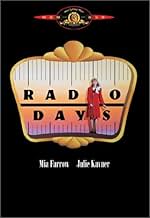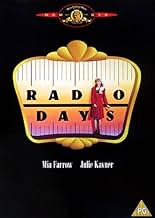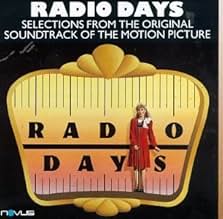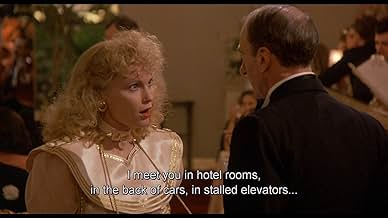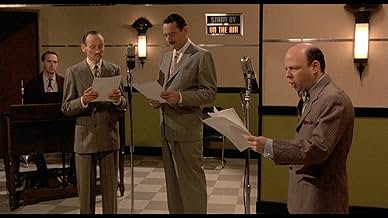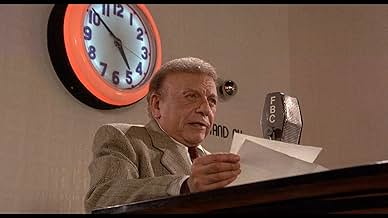Radio Days
- 1987
- Tous publics
- 1h 28min
NOTE IMDb
7,4/10
38 k
MA NOTE
Un regard nostalgique sur l'âge d'or de la radio axé sur une famille ordinaire et les différents interprètes de l'époque.Un regard nostalgique sur l'âge d'or de la radio axé sur une famille ordinaire et les différents interprètes de l'époque.Un regard nostalgique sur l'âge d'or de la radio axé sur une famille ordinaire et les différents interprètes de l'époque.
- Réalisation
- Scénario
- Casting principal
- Nommé pour 2 Oscars
- 3 victoires et 10 nominations au total
Mick Murray
- Avenger Crook
- (as Michael Murray)
Renée Lippin
- Ceil
- (as Renee Lippin)
Avis à la une
Radio Days (1987)- written, directed, and narrated by Allen:
What a beautiful, kind, gentle, ironic, warm, sentimental (in a very good way and yes, I am talking about Woody Allen's movie, that's right) yet perfectly balanced delight. It is a series of sketches about young Joe (young Allen, of course, played by Seth Green - that was a surprise), an adolescent in Brooklyn, NY during 1930s-1940s who was passionately in love with radio which was a king. The film is a tribute to the magical radio days and the myths and legends about radio personalities, the memory of a grown man who never forgot where he came from, the love letter to his always fighting and arguing ("I mean, how many people argue over oceans?") but loving relatives and a very funny comedy (the way only Allen's comedy can be). It is the film where pretty like a doll and painfully naive Sally (Mia Farrow) asks who Pearl Harbor is? Where gorgeous Diane Keaton sings and Diane Wiest, his beloved Aunt Bea never gives up hope of one true love. He never told us if she found it...
"I never forgot that New Year's Eve when Aunt Bea awakened me to watch 1944 come in. I've never forgotten any of those people or any of the voices we would hear on the radio. Though the truth is, with the passing of each New Year's Eve, those voices do seem to grow dimmer and dimmer."
The Radio days are gone but thanks to Allen, the voices of the times passed are still clear and sound and they always will be.
9/10
What a beautiful, kind, gentle, ironic, warm, sentimental (in a very good way and yes, I am talking about Woody Allen's movie, that's right) yet perfectly balanced delight. It is a series of sketches about young Joe (young Allen, of course, played by Seth Green - that was a surprise), an adolescent in Brooklyn, NY during 1930s-1940s who was passionately in love with radio which was a king. The film is a tribute to the magical radio days and the myths and legends about radio personalities, the memory of a grown man who never forgot where he came from, the love letter to his always fighting and arguing ("I mean, how many people argue over oceans?") but loving relatives and a very funny comedy (the way only Allen's comedy can be). It is the film where pretty like a doll and painfully naive Sally (Mia Farrow) asks who Pearl Harbor is? Where gorgeous Diane Keaton sings and Diane Wiest, his beloved Aunt Bea never gives up hope of one true love. He never told us if she found it...
"I never forgot that New Year's Eve when Aunt Bea awakened me to watch 1944 come in. I've never forgotten any of those people or any of the voices we would hear on the radio. Though the truth is, with the passing of each New Year's Eve, those voices do seem to grow dimmer and dimmer."
The Radio days are gone but thanks to Allen, the voices of the times passed are still clear and sound and they always will be.
9/10
In preface, let me say that I was born at the tail-end of the "golden age of radio," but just in time to experience a touch of its magic and the hold it had on households night after night in that pre-TV era. Add to that a favorite aunt who had worked in radio for years on the West Coast and who regaled her nephew with story upon story, which in turn led to the years I later spent in radio (luckily, prior to the "formula radio" days). It all adds up to my absolutely having to go see "Radio Days" when it first came out, despite the fact that I'd never been the world's foremost Woody Allen fan. Too much of his work, for me, lacked that indefinable but oh so recognizable element of "heart."
Well, I was wrong about Woody. This film shows it.
Autobiographical -- or perhaps semi-autobiographical -- in nature, "Radio Days" evokes the time when people returned "to those thrilling days of yesteryear," and for whom, quite probably, it was equally thrilling to contemplate the magic of a box in their living room that could cause them to "watch" the stories unfold in their minds. "Remotes," or on-the-spot broadcasts transported them to the scene of unfolding tragedies or triumphs in a way that newspapers never could (and which TV, for all its advantages, rarely matches).
And yet the film, for all its authenticity in recreating studio practices (watch, for example, how the actors drop completed script pages onto the floorrather than turning them and risking a tell-tale rustle of paper), isn't really so much about radio itself as it is about the people who listened, as personified by one raucous, cantankerous and loving Brooklyn family. Beautifully evoked, particularly by Julie Kavner (Mother), Michael Tucker (Father), and the incomparable Dianne Wiest (as the perenially lovelorn Aunt Bea), it is their reactions to what they hear on the radio -- whether listening breathlessly to the war news (at a time when the end result was anything but certain) or Bea's abandonment in the middle of nowhere by a panicked suitor as Orson Welles' "War of the Worlds" broadcast takes hold -- that bring to life the era and the power of that medium.
Standouts? The whole cast is perfect, but for me, in addition to those previously mentioned, I have to cit Mia Farrow's portrayal of the dim-bulbed Sally White, who transforms herself with the aid of speech lessons into a radio personality. (For that matter, catch Danny Aiello as a less-than-brilliant hitman, particularly his scenes with Dina DeAngeles as his mom.)
Criticisms? One: At the end of a poignant scene in which young Joe has finally discovered what his dad does for a living, Allen insists on falling into some standby "schtick" in his voiceover. (I guess he couldn't resist; thankfully, it doesn't ruin the moment.)
Ultimately, of course, it is the era itself that this film celebrates. Faithfully, and lovingly, it is recreated with a skill that points up its absurdities at the same time it makes one hopefully nostalgic. And, if you're not very careful, you wind up falling hopelessly in love with this funny, obscure Brooklyn family.
And to the end of my days, I'll always wonder whether poor Aunt Bea ever did find her "Mr. Right" . . .
Well, I was wrong about Woody. This film shows it.
Autobiographical -- or perhaps semi-autobiographical -- in nature, "Radio Days" evokes the time when people returned "to those thrilling days of yesteryear," and for whom, quite probably, it was equally thrilling to contemplate the magic of a box in their living room that could cause them to "watch" the stories unfold in their minds. "Remotes," or on-the-spot broadcasts transported them to the scene of unfolding tragedies or triumphs in a way that newspapers never could (and which TV, for all its advantages, rarely matches).
And yet the film, for all its authenticity in recreating studio practices (watch, for example, how the actors drop completed script pages onto the floorrather than turning them and risking a tell-tale rustle of paper), isn't really so much about radio itself as it is about the people who listened, as personified by one raucous, cantankerous and loving Brooklyn family. Beautifully evoked, particularly by Julie Kavner (Mother), Michael Tucker (Father), and the incomparable Dianne Wiest (as the perenially lovelorn Aunt Bea), it is their reactions to what they hear on the radio -- whether listening breathlessly to the war news (at a time when the end result was anything but certain) or Bea's abandonment in the middle of nowhere by a panicked suitor as Orson Welles' "War of the Worlds" broadcast takes hold -- that bring to life the era and the power of that medium.
Standouts? The whole cast is perfect, but for me, in addition to those previously mentioned, I have to cit Mia Farrow's portrayal of the dim-bulbed Sally White, who transforms herself with the aid of speech lessons into a radio personality. (For that matter, catch Danny Aiello as a less-than-brilliant hitman, particularly his scenes with Dina DeAngeles as his mom.)
Criticisms? One: At the end of a poignant scene in which young Joe has finally discovered what his dad does for a living, Allen insists on falling into some standby "schtick" in his voiceover. (I guess he couldn't resist; thankfully, it doesn't ruin the moment.)
Ultimately, of course, it is the era itself that this film celebrates. Faithfully, and lovingly, it is recreated with a skill that points up its absurdities at the same time it makes one hopefully nostalgic. And, if you're not very careful, you wind up falling hopelessly in love with this funny, obscure Brooklyn family.
And to the end of my days, I'll always wonder whether poor Aunt Bea ever did find her "Mr. Right" . . .
In my opinion, Radio Days is right up there with Annie Hall though it's different in that it's following several people's lives. Woody doesn't act in this, but his narration is excellent.
He takes the wonderful old songs and commercials from that time and weaves them into the story. I was completely captivated.
It's not a "laugh a minute" type film, but it also gets you thinking. Nevertheless, it has some hilarious scenes. Check out the Jewish fasting holiday scene. I've watched it at least 6 times and I still laugh. Also the scene with Mia Farrow's character was superb. One of my favorite lines is when she tells a top radio producer in her high-pitched nasal voice, "Jeez. We can't keep meeting like this. In the backs of cars, movie theaters and stalled elevators. You're gonna lose your respect for me!" I love this film.
He takes the wonderful old songs and commercials from that time and weaves them into the story. I was completely captivated.
It's not a "laugh a minute" type film, but it also gets you thinking. Nevertheless, it has some hilarious scenes. Check out the Jewish fasting holiday scene. I've watched it at least 6 times and I still laugh. Also the scene with Mia Farrow's character was superb. One of my favorite lines is when she tells a top radio producer in her high-pitched nasal voice, "Jeez. We can't keep meeting like this. In the backs of cars, movie theaters and stalled elevators. You're gonna lose your respect for me!" I love this film.
If you are looking for the normal amount of big laughs from a Woody Allen film, then you will be disappointed here. It's not that kind of film.
I was anything but disappointed, but I knew what the film was all about before I saw it. Actually, what drew me to it was that I had read where this was a wonderful visual film, filled with rich colors and great set designs. It did not let me down. This is a great visual tribute to the 1940s, to be exact from 1938 to 1944. A real treat for the eyes.
The story centers around a Jewish family in Queens and the importance that radio shows had in that day-and-age. Also profiled in here are some of those radio performers.
It does have laughs but not as many as the normal Allen movie because the idea of this is simply to be a nostalgic piece, mainly Allen's tribute to his own family days of growing up, what it was like around his house.
It was interesting to see Seth Green playing Woody as a youngster with flaming red hair. The most interesting person, however, was Diane Wiest who played a man-chasing sister-in-law. The film gives you a real flavor of the period, of New York and of a Jewish family.
Overall, it's simply a nice film....and gorgeous to look at. Sometimes I think some of Allen's work is overrated but, boy, here is one that is definitely underrated.
I was anything but disappointed, but I knew what the film was all about before I saw it. Actually, what drew me to it was that I had read where this was a wonderful visual film, filled with rich colors and great set designs. It did not let me down. This is a great visual tribute to the 1940s, to be exact from 1938 to 1944. A real treat for the eyes.
The story centers around a Jewish family in Queens and the importance that radio shows had in that day-and-age. Also profiled in here are some of those radio performers.
It does have laughs but not as many as the normal Allen movie because the idea of this is simply to be a nostalgic piece, mainly Allen's tribute to his own family days of growing up, what it was like around his house.
It was interesting to see Seth Green playing Woody as a youngster with flaming red hair. The most interesting person, however, was Diane Wiest who played a man-chasing sister-in-law. The film gives you a real flavor of the period, of New York and of a Jewish family.
Overall, it's simply a nice film....and gorgeous to look at. Sometimes I think some of Allen's work is overrated but, boy, here is one that is definitely underrated.
RADIO DAYS is one of Woody Allen's most underrated comedies, a fond look back to the days of radio and its effects on his family.
Set against long-forgotten radio programs, hit songs, and the coming of World War II, we get two narrative threads. The Rockaway family dealing with everyday issues in a series of vignettes, and the fictional life of Sally White (Mia Farrow) as she rises from cigarette girl to glittering radio star.
The cast is excellent. Farrow has a solid role as the Brooklyn girl with the Judy Holliday voice who battles her way toward upward mobility. Julie Kavner and Michael Tucker are terrific as the parents. Dianne Wiest is sweet as Aunt Bea, always on the lookout for true love. Seth Green plays Woody as a kid. Diane Keaton and Kitty Carlisle show up as singers. Josh Mostel and Renee Lippin are hilarious as the aunt and uncle. Wallace Shawn has a funny bit as the "Masked Avenger." Other notables include Richard Portnow as Si, Kenneth Mars as the rabbi, Larry David as the crazed neighbor, Jeff Daniels and William H. Macy as radio actors, Tony Roberts as the game show host, Danny Aiello as the gangster, and a special kudo for the hilarious Gina DeAngelis as his mother.
Highlights include Bea's date on the night of Orson Welles' famous radio program about a Martian invasion, and the poignant episode about the live radio coverage of a girl who's fallen down a well. The film also takes nostalgic looks at radio serials, quiz programs, and comedy shows.
The film perfectly captures the middle class neighborhood of Allen's youth. The interiors are beautifully done (Santo Loquasto), and very memorable is the awe-inspiring visit to Radio City Music Hall with its dimmed lights, lush carpets, and warm red-and-gold tones.
There is also a parade oh hit songs of the day that include "September Song," "Tico Tico," "Mairzy Doats," "South American Way," "Pistol Packin' Mama," "If I Didn't Care," and so many others.
A final word for the many actors and actresses in small parts who make this movie feel so right. Many have walk-ons or have only a line or two but they add the perfect touch and help recreate Woody Allen's beloved New York City.
Set against long-forgotten radio programs, hit songs, and the coming of World War II, we get two narrative threads. The Rockaway family dealing with everyday issues in a series of vignettes, and the fictional life of Sally White (Mia Farrow) as she rises from cigarette girl to glittering radio star.
The cast is excellent. Farrow has a solid role as the Brooklyn girl with the Judy Holliday voice who battles her way toward upward mobility. Julie Kavner and Michael Tucker are terrific as the parents. Dianne Wiest is sweet as Aunt Bea, always on the lookout for true love. Seth Green plays Woody as a kid. Diane Keaton and Kitty Carlisle show up as singers. Josh Mostel and Renee Lippin are hilarious as the aunt and uncle. Wallace Shawn has a funny bit as the "Masked Avenger." Other notables include Richard Portnow as Si, Kenneth Mars as the rabbi, Larry David as the crazed neighbor, Jeff Daniels and William H. Macy as radio actors, Tony Roberts as the game show host, Danny Aiello as the gangster, and a special kudo for the hilarious Gina DeAngelis as his mother.
Highlights include Bea's date on the night of Orson Welles' famous radio program about a Martian invasion, and the poignant episode about the live radio coverage of a girl who's fallen down a well. The film also takes nostalgic looks at radio serials, quiz programs, and comedy shows.
The film perfectly captures the middle class neighborhood of Allen's youth. The interiors are beautifully done (Santo Loquasto), and very memorable is the awe-inspiring visit to Radio City Music Hall with its dimmed lights, lush carpets, and warm red-and-gold tones.
There is also a parade oh hit songs of the day that include "September Song," "Tico Tico," "Mairzy Doats," "South American Way," "Pistol Packin' Mama," "If I Didn't Care," and so many others.
A final word for the many actors and actresses in small parts who make this movie feel so right. Many have walk-ons or have only a line or two but they add the perfect touch and help recreate Woody Allen's beloved New York City.
Le saviez-vous
- AnecdotesThe story of Kirby Kyle, the ill-fated baseball player, is a parody of former Chicago White Sox pitcher Monty Stratton, whose promising career was derailed after he lost part of his leg due to a hunting accident. Stratton attempted a comeback and then retired. His life was made into a movie: Un homme change son destin (1949).
- GaffesIn one scene, a pack of Camel cigarettes lies on a table, with a clearly visible bar code on the side of the package. The Universal Product Code would not be introduced until the 1970s.
- Citations
[Last lines]
Narrator: I never forgot that New Year's Eve when Aunt Bea awakened me to watch 1944 come in. I've never forgotten any of those people or any of the voices we would hear on the radio. Though the truth is, with the passing of each New Year's Eve, those voices do seem to grow dimmer and dimmer.
- Bandes originalesThe Flight of the Bumblebee
(1899-1900)
Music by Nikolai Rimsky-Korsakov
Performed by Harry James
Courtesy of CBS Records
Played during the opening credits
Meilleurs choix
Connectez-vous pour évaluer et suivre la liste de favoris afin de recevoir des recommandations personnalisées
Détails
- Date de sortie
- Pays d’origine
- Site officiel
- Langues
- Aussi connu sous le nom de
- Días de radio
- Lieux de tournage
- Radio City Music Hall - 1260 6th Avenue, Rockefeller Center, Manhattan, Ville de New York, New York, États-Unis(Joe, his Aunt Bea and her date see a movie there)
- Sociétés de production
- Voir plus de crédits d'entreprise sur IMDbPro
Box-office
- Budget
- 16 000 000 $US (estimé)
- Montant brut aux États-Unis et au Canada
- 14 792 779 $US
- Week-end de sortie aux États-Unis et au Canada
- 1 522 423 $US
- 1 févr. 1987
- Montant brut mondial
- 14 792 779 $US
Contribuer à cette page
Suggérer une modification ou ajouter du contenu manquant

Lacune principale
By what name was Radio Days (1987) officially released in India in English?
Répondre


